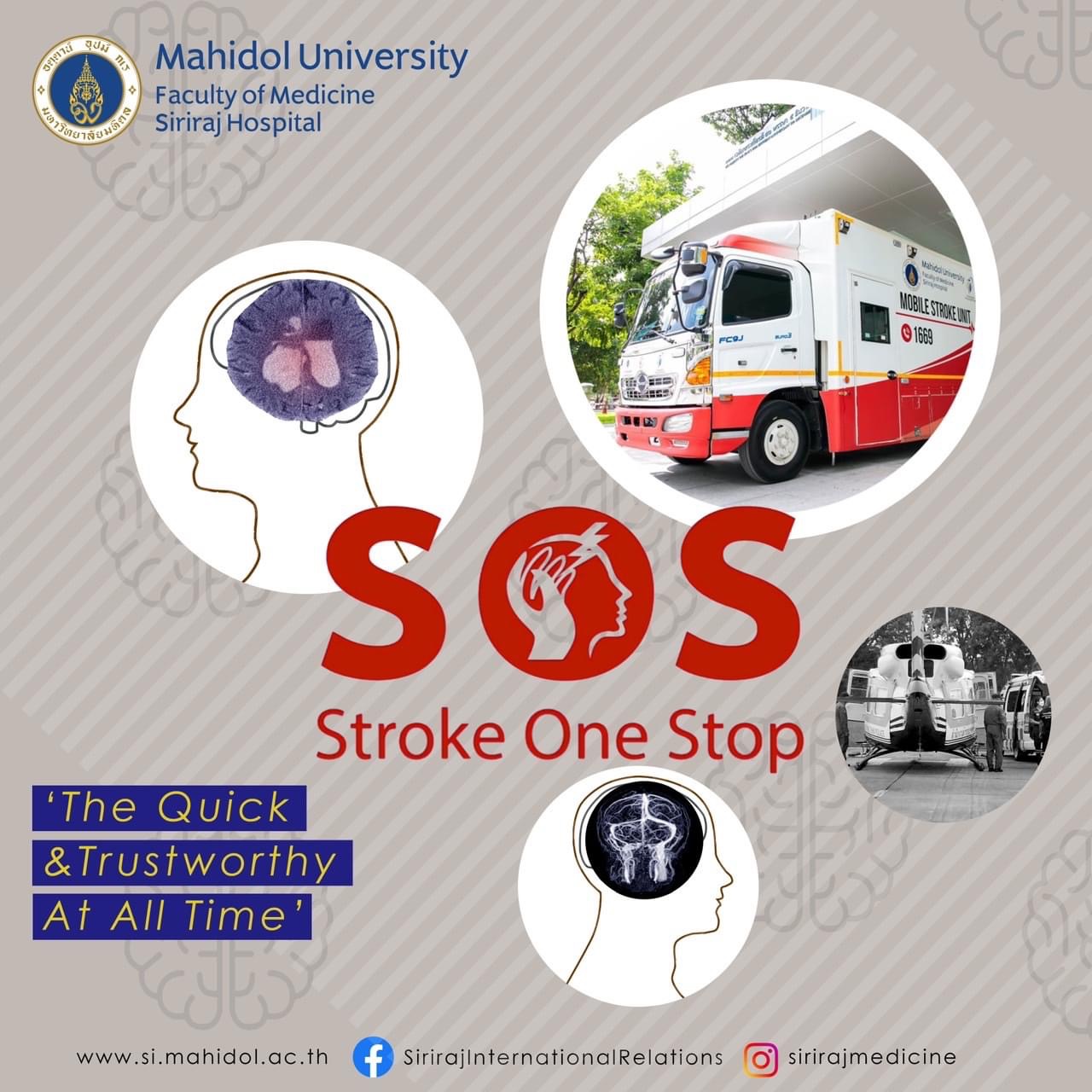Siriraj Stroke Center
Cerebrovascular disease or stroke is a challenging condition worldwide. Thailand’s incidence is approximately 1,880 per 100,000 people and it’s on the rise as the country has approached aged society. Siriraj Stroke Center was established in 2015 by the Faculty of Medicine Siriraj Hospital in collaboration with the Division of Neurology Department of Medicine, the Division of Interventional Neuroradiology Department of Radiology, and the Division of Neurosurgery Department of Surgery to provide comprehensive stroke-related medical services, education, and research.
To effectively treat the patients with stroke, restoring the blood circulation to prevent permanent death of neurone cells is crucial. The lower incidence of mortality and disabilities has been clearly demonstrated by the administration of thrombolytic agents within 3 hours after the onset of symptoms. Multidisciplinary-team-based rehabilitation is also important for the recovery of the patients.
Stroke One Stop (SOS) – The mobile stroke unit
Stroke One Stop (SOS) has been introduced after the launch of the Mobile Stroke Unit and the set up of the Comprehensive Stroke Unit. When the ‘1669’ emergency number is called, a mobile stroke unit with an onboard CT scanner and a medical team consisting of a doctor, nurse, and radiologic technician will arrive immediately to begin initial management. In a short amount of time, a history taking, basic physical examinations, and a brain scan will be performed. Furthermore, the contrast media injection can be done onboard to enable a precise diagnosis. The scan’s results will be transmitted to experts via 5G wireless technology in a real-time manner.
According to many available evidences that support the benefits of early administration of thrombolytic agents in case of cerebral thrombosis, the team will administer a thrombolytic agent under the supervision of the experts to timely restore the cerebral perfusion. After initial management, the patients will be admitted to comprehensive stroke unit for continued treatments and transcatheter thrombectomy might be considered if the clot is large enough. In this way, we could lessen the severity of the condition and the likelihood of permanent disability in many of the patients.
The Service Area of Stroke One Stop
Until recently, Siriraj Mobile Stroke Unit has provided the services covering the west side of Bangkok and Nonthaburi province. Under the supervision of Siriraj Stroke Unit, the system has gradually expanded throughout the country, including Chonburi province (Eastern), Ratchaburi province (Western), Surat Thani province (Southern), while Chiang Rai and Nakhon Phanom province, which will cover the Northern and North Eastern areas respectively will be kicking off the services within this year.
To be able to help the people to a greater extent, particularly in remote areas, the Faculty of Medicine Siriraj Hospital, in collaboration with the Faculty of Engineering Mahidol University, National Institute of Emergency Medicine, Police Air Force, and hospitals in Southern areas had joined in an air-and-ground transferring practice at Surat Thani province in November 2021 to even shorten the time for thrombectomy. A helicopter will assist in the transfer of patients from inaccessible or remote locations to the mobile stroke unit, which will offer the aforementioned initial management before transporting the patients to the appropriate medical facility.
CT Scanners in the mobile stroke unit
Siriraj Comprehensive Stroke Unit, which is equipped with cutting-edge medical technologies, in-place CT scanners, and a team of medical professionals, can accommodate 11 critical and 9 semi-critical stroke patients with very high standards of care. Ischemic stroke, hemorrhagic stroke, arteriovenous malformation, and intracranial aneurysm are the common acute stroke conditions treated at this ward.
The emergency services for stroke patients
Each year Siriraj Stroke Center provides finest medical care to 1,200-1,500 acute stroke patients. During the last 3 years, the Mobile Stroke Unit had offered emergency services to more than 600 acute stroke patients whose recovery rate was as high as 70%. The door-to-needle time less than 60 minutes could be achieved in more than 90% of the cases (within 30 minutes in many cases). The consultation time to puncture time for thrombectomy has been approximately 70 minutes. The mortality rate of acute stroke patients is around 5%.
We at Siriraj strongly believe that nobody should ever have to suffer from a stroke. We continue to produce stroke experts, educate the public about disease awareness and prevention, conduct many researches to improve the outcomes of the patients. We are pleased to put our philosophy, which is ‘to the benefit of mankind’, into practice, which results in “a life without stroke” of the Thais and others in the region.


 Published
Published